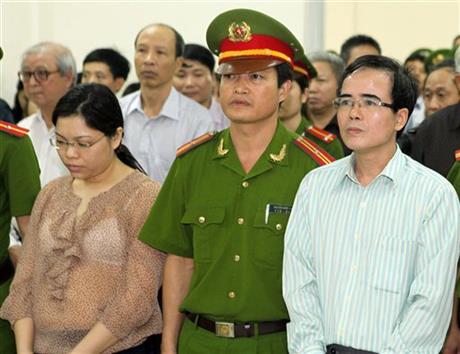
By CHRIS BRUMMITT
A U.S-trained lawyer and well-known dissident Le Quoc Quan, right, listens to the judge during his trial in Hanoi, Vietnam on Wednesday Oct. 2, 2013. The Hanoi People’s court sentenced him to 30 months in jail after finding him guilty on tax evasion charges, the latest salvo in a crackdown against activists in the authoritarian Southeast Asian nation. A Vietnamese court sentenced Le to 30 months in jail Wednesday after finding him guilty on tax evasion charges, the latest salvo in a crackdown against activists in the authoritarian Southeast Asian nation. (AP Photo/Vietnam News Agency, Doan Tan)
HANOI, Vietnam (AP) — A Vietnamese court sentenced a U.S-trained lawyer and well-known dissident to 30 months in jail Wednesday after finding him guilty on tax evasion charges, the latest salvo in a crackdown against activists in the authoritarian Southeast Asian nation.
The verdict against Le Quoc Quan was immediately criticized by the United States, which is pressing Vietnam’s Communist leaders to loosen restrictions on those advocating democracy and human rights. Washington, along with human rights groups and other observers, had considered the charges against Quan to be politically motivated.
Quan, who maintained a popular blog that highlighted human rights abuses and other issues off-limits to the state media, proclaimed his innocence throughout the one-day trial. Hundreds of his supporters braved an intense security crackdown to rally in the normally sleepy city during the trial.
“I have long been denouncing and fighting against corruption, bureaucracy and the stagnation that is doing harm to this country,” Quan said. “To be frank, I was prosecuted because I love this country,” he said before the audio and video feed into a side-room where a small number of reporters and diplomats were allowed to listen to proceedings was briefly cut off.
Presiding Judge Le Thi Hop said Quan was found guilty of evading corporate income tax of $30,000 in relation to a consultancy he had headed before his arrest last December in Hanoi. He was also fined $60,000. The maximum penalty Quan could have received was seven years.
Trials in Vietnam do not meet international standards for fairness, according to human rights groups. Quan was giving access to lawyers during his detention, but his family had been prevented from meeting him.
The U.S. Embassy in Hanoi said the use of tax laws “to imprison government critics for peacefully expressing their political views is disturbing” and called on the government to “release all prisoners of conscience and allow Vietnamese to peacefully express their political views.”
The verdict could complicate efforts by the Obama administration to press ahead with a free trade pact it is currently negotiating with Vietnam and other Asian-Pacific nations. Congress will have to pass any deal, and U.S. officials have said that ongoing human rights abuses in the country will make it a difficult sell.
Quan, in his early 40s, was detained in 2007 for three months on his return from a U.S. government-funded fellowship in Washington. He kept up his activism, meeting with reporters and diplomats, and taking part in peaceful protests against Chinese sovereignty claims over parts of the South China Sea in 2011. He is a Roman Catholic and drew some of his support from the church, which has difficult relations with the Hanoi government because of its social activism.
Vietnam converted to a market economy in the late 1980s and wants to integrate with the world, but maintains strict controls on freedom of speech and political expression. Bloggers, activists and others are routinely arrested and imprisoned. Foreign media representatives are allowed to live in Vietnam but are subject to restrictions on where they can travel and what they can report.
The Internet has emerged as a vital organizing tool for dissidents in recent years, and there has been a surge of blogs and Facebook pages highlighting criticism of the government. The rise of the Internet, combined with an economic slowdown, has left the ruling elite feeling vulnerable.
In an interview with The Associated Press last September, Quan said he was under constant surveillance and that he, his family and staff received frequent warnings and pressure from authorities. But he pledged to keep speaking out against the government and in favor of multi-party democracy and freedom of speech and religion.



